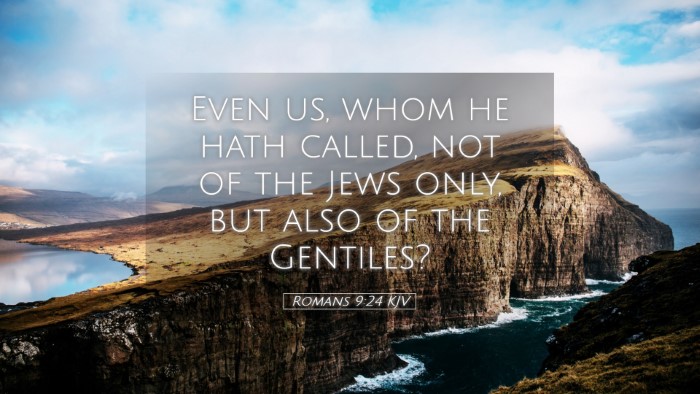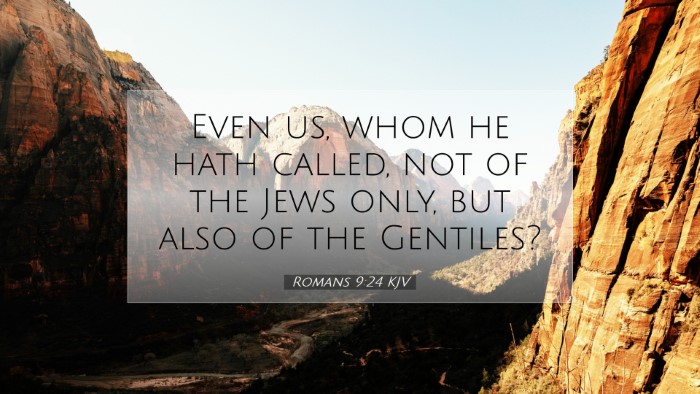Commentary on Romans 9:24
Verse: "Even us, whom he hath called, not of the Jews only, but also of the Gentiles?"
Overview
This verse is a continuation of the Apostle Paul's discourse on the sovereignty of God in the matter of salvation. Paul addresses the divine calling of individuals, emphasizing that it extends beyond the covenant people of Israel to include the Gentiles. This commentary aggregates insights from the renowned public domain commentaries of Matthew Henry, Albert Barnes, and Adam Clarke to provide a thorough exploration of the theological implications of this verse.
The Meaning of 'Called'
Matthew Henry notes that the term "called" signifies both the divine initiative in salvation and the specific vocation that accompanies belonging to God. He argues that the call is not merely an invitation but an effective summons that results in a transformation in the lives of those called. This divine calling showcases God's grace, which is not limited to a particular ethnic group but extends to all humanity.
Albert Barnes elaborates on the nature of this calling, marking it as both “external” and “internal.” The external call is the proclamation of the Gospel, while the internal call is the work of the Holy Spirit, changing the hearts of those who hear. Barnes emphasizes that both Jews and Gentiles receive this call, showcasing the inclusive nature of God's plan for salvation.
God's Sovereign Choice
In light of sovereignty, Adam Clarke highlights that this verse illustrates God's sovereign choice. He delineates a clear distinction between the privileges of Israelites and that of Gentiles, showing that God's electing grace does not conform to human standards or expectations. Clarke cites various Old Testament prophecies to assert that God always intended to include Gentiles in His redemptive plan.
Matthew Henry adds that this inclusion magnifies God's mercy, emphasizing that it is solely through His call that any are saved. He reflects on the paradox of divine election wherein God chooses some and passes others by, urging contemplation of God's unsearchable judgment and mercy.
Covenant and Inclusion
Albert Barnes further examines the covenantal aspect of this calling. He posits that while the Jews were the original heirs of God's promises, the call to the Gentiles illustrates the enlargement of God's covenant scope. Barnes cites Ephesians 2:12-13 to analogously show how Gentiles are now made fellow heirs, emphasizing the unity that should exist among believers from both groups.
Adam Clarke connects this idea to the doctrine of inclusion, suggesting that one of the key messages of the Gospel is the breaking down of barriers that had previously existed. Clarke encourages readers to embrace the active participation of Gentiles in the promises of God, which signifies a new order in God's redemptive work.
Practical Applications
This verse invites various applications for believers and leaders in the church. First, it emphasizes the importance of evangelism across cultural boundaries. As Matthew Henry insists, the church is tasked with preaching the Gospel to all nations, reflecting God’s desire for inclusivity.
- Unity in Diversity: Believers are reminded to celebrate the diversity brought by different ethnic backgrounds in the body of Christ. According to Albert Barnes, this diversity is a testament to God's grace that transcends human categories.
- Understanding Divine Grace: Pastors and theologians must grapple with the implications of divine grace in their teaching. As Adam Clarke notes, understanding that God calls individuals from all backgrounds should inspire humility and gratitude, leading to a deeper appreciation of God's mercy.
- Engaging with Society: The church is called to engage with both the Jewish and Gentile contexts. The proper response involves extending God’s love and message of salvation actively and faithfully.
Theological Reflections
In Romans 9:24, the theologian is prompted to reflect on the mystery of God's grace. Theologically, this verse underpins the doctrine of election, suggesting that God's choice is based on His will and purpose rather than human desires or efforts. Matthew Henry eloquently describes the calling as "the distinguishing grace of God," while Albert Barnes encourages an understanding of it as a demonstration of God’s sovereignty in fulfilling His promises.
Adam Clarke emphasizes that this verse invites every believer to reflect on their place in God’s grand narrative. The inclusion of Gentiles affirms that God's redemptive work is comprehensive and far-reaching, drawing all who are willing to respond to His call.
Conclusion
Romans 9:24 is a profound verse that encapsulates the essence of God’s calling to both Jews and Gentiles. By drawing from the insights of Matthew Henry, Albert Barnes, and Adam Clarke, we have explored its implications for understanding divine sovereignty, grace, inclusion, and our response as the church. This verse serves as a reminder of the richness of God's mercy towards all mankind, a theme that holds significant relevance for pastors, students, theologians, and Bible scholars alike.


